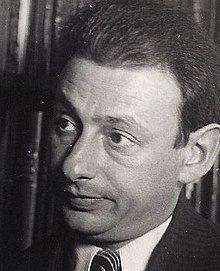This article's lead section may be too long. (April 2024) |
Gershom Scholem | |
|---|---|
| גרשום שלום | |
 Scholem, 1935 | |
| Born | Gerhard Scholem 5 December 1897 |
| Died | 21 February 1982 (aged 84) |
| Nationality | German Israel |
| Alma mater | Frederick William University |
| Notable work | Sabbatai Zevi, the Mystical Messiah Major Trends in Jewish Mysticism |
| Spouse | Fania Freud Scholem |
| Awards | Israel Prize Bialik Prize |
| Era | 20th-century philosophy |
| Region | German philosophy Jewish philosophy |
| School | Continental philosophy Kabbalah Wissenschaft des Judentums |
| Institutions | Hebrew University of Jerusalem |
Main interests | Philosophy of religion Philosophy of history Mysticism Messianism |
Gershom Scholem (Hebrew: גֵרְשׁׂם שָׁלוֹם) (5 December 1897 – 21 February 1982) was a German-born Israeli philosopher and historian. Widely regarded as the founder of modern academic study of the Kabbalah, Scholem was appointed the first professor of Jewish mysticism at Hebrew University of Jerusalem.[1]
Scholem is acknowledged as the single most significant figure in the recovery, collection, annotation, and registration into rigorous Jewish scholarship of the canonical bibliography of mysticism and scriptural commentary that runs through its primordial phase in the Sefer Yetzirah, its inauguration in the Bahir, its exegesis in the Pardes and the Zohar to its cosmogonic, apocalyptic climax in Isaac Luria's Ein Sof that is known collectively as Kabbalah.[2][3]
After generations of demoralization and assimilation in the European enlightenment,[4] the disappointment of messianic hopes,[4] the famine of 1916 in Palestine,[5] and the catastrophe of the Final Solution in Europe[6] Scholem gathered and reassembled these sacred texts from many of the archives that had been disarranged, orphaned, confiscated under Nazi rule or otherwise washed up in Genizah cataloging the flood of fragments and disordered, decontextualized manuscripts into an annotated and relatively organized sequence of texts available to scholars and seekers within the reception of this tradition. Many other Jewish scholars assisted in this process of recovery once it was underway, but it is broadly recognized that Scholem initiated this process of textual and archival recovery and rebirth.
As Scholem points out in his memoirs, the canon of sacred Jewish writings from the diaspora and the Middle Ages (re: "Kabbalah") had fallen into such a state of disrepair and oblivion—fragmented and effaced by persecutions from without as well as contortions, conversions and schisms from within Judaism—that many of the "finest writings..."[7] from the major currents of Jewish mysticism could only be found in long block quotations in antisemitic texts, where some "nincompoop who had quoted and translated the most wonderful, the most profound things,"[7] had assembled them "in order to decry them as blasphemies."[7] (This was a strong, somewhat exaggerated statement for expressive effect that Scholem attributes to Ernst Bloch in his memoirs—but there he co-signs the sentiment and appropriates it as his own description of the state of affairs in other places.)[8][2][3]
Due to Scholem's efforts, and those of his students and colleagues, the confused and inscrutable condition of Kabbalistic bibliography and provenance would be significantly remedied after the end of the World Wars and the foundation of the modern state of Israel where Scholem worked as head librarian of the National Library in Jerusalem.
- ^ Magid, Shaul (14 May 2024). Edward N. Zalta (ed.). Gershom Scholem. Stanford Encyclopedia of Philosophy (Spring 2009 Edition).
- ^ a b Scholem, Gershom (1987). Origins of the Kabbalah. R. J. Zwi Werblowsky. [Philadelphia]: Jewish Publication Society. ISBN 0-691-07314-7. OCLC 13456988.
- ^ a b Scholem, Gershom (1961). Major trends in Jewish mysticism. New York: Schocken Books. ISBN 0-8052-0005-3. OCLC 670936.
- ^ a b Scholem, Gershom (2016). Sabbatai Ṣevi; the mystical Messiah, 1626–1676. Princeton, NJ. ISBN 978-0-691-17209-5. OCLC 959423350.
{{cite book}}: CS1 maint: location missing publisher (link) - ^ PROCHNIK, GEORGE (2018). STRANGER IN A STRANGE LAND : searching for gershom scholem and jerusalem. [Place of publication not identified]: GRANTA Books. p. 133. ISBN 978-1-78378-180-5. OCLC 992451184.
- ^ Cite error: The named reference
:0was invoked but never defined (see the help page). - ^ a b c Scholem, Gershom (1982). Walter Benjamin : the story of a friendship. London: Faber and Faber. pp. 80, 105. ISBN 0-571-11970-0. OCLC 9983412.
- ^ Scholem, Gershom (2006). Alchemy and kabbalah. Klaus Ottmann. Putnam, Conn.: Spring Publications. ISBN 0-88214-566-5. OCLC 63245451.